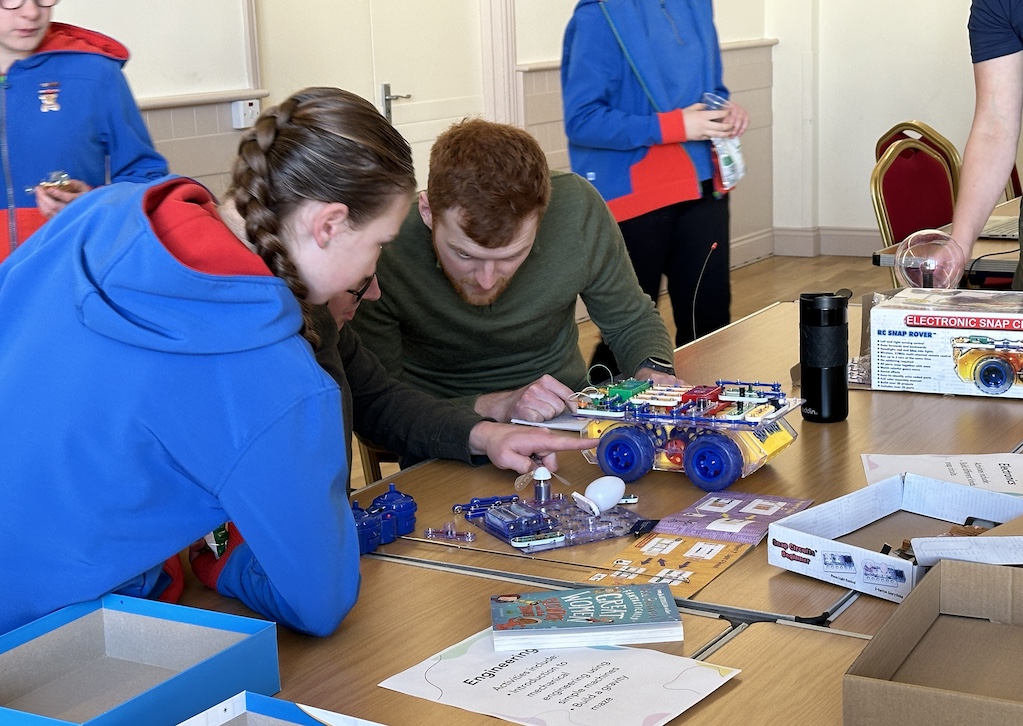February 11th, 2024, was the 9th International Day of Women and Girls in Science, a United Nations-led day that serves as a reminder that women and girls play a critical role in science and technology communities. In continuation of their commitment to the next generation of geeks-to-be, the team at Cortex Technologies partnered with Girlguiding Guernsey to mark the day.
Amy Madden, who joined Cortex in 2023 as a software developer, combined her experience as guide section adviser at Girlguiding Guernsey, to create the “Girls Who Innovate Hub†- an event designed to inspire girls in the world of tech. The event consisted of a variety of STEM-focused activities like designing video games, assembling solar-powered robots and exploring various gadgets and engineering exercises, interspersed with engaging presentations from female leaders and IT professionals. Amy said, “It was amazing to merge my work in tech with my role at Girlguiding and offer the girls a glimpse into how technology shapes our lives. With this event, we wanted to emphasise the notion that innovation belongs to everyone and ensure the girls see the diverse paths available in the tech world."
The importance of the International Day of Women and Girls in Science
Established by the United Nations General Assembly in 2015, the day aims to promote full and equal access for women and girls in the field of science through awareness-raising and educational activities. Although progress has been made, women still only make up 20% of the IT workforce in the UK as of 2022, which is an improvement from previous years but still falls short of the highest representation in 1991.
Throughout history, women have played important roles in technology, such as during World War II when 75% of Bletchley Park's staff, the epicentre of the British codebreaking operation, were women. Ada Lovelace is often credited as the first person to create a computer programme. Nevertheless, women still come across hurdles when pursuing tech careers, including gender bias, under-representation and a gender pay gap surpassing the national average by 3.4%.
A PwC survey uncovered that 33% of male respondents had technology careers suggested to them whilst only 16% of female respondents reported the same, highlighting why educating and inspiring the younger generation, and particularly girls, about the technology sector is important.
Meeting local female IT professionals and role models
If girls don’t see women in IT jobs, it’s difficult for them to picture themselves as a future techie. In 2017, men held 95% of leadership positions in the technology industry, which is why it wasn’t surprising that 78% of students in the survey by PwC, couldn’t name a single famous woman working in the sector. The Girls Who Innovate Hub incorporated presentations from female technology professionals, to introduce girls to local role models.
The first speaker at the event was data engineer Katie Inder. During her presentation, she explored different paths in the field of data and talked through examples of how data impacts our day-to-day interactions with technology and beyond. Katie said, “It's so important for young girls to see women in typically male-dominated careers. Inspiring the next generation helps to shape the future of technology and innovation†Throughout the afternoon, the speakers and other local female IT professionals stayed to support the groups throughout their activities and were available to answer questions.
Opening doors into the sector
Raising awareness about the technology industry and its opportunities is important, but it isn't sufficient if students don't perceive a career in technology as accessible. Cortex have a history of working with the local educational establishments, such as supporting the College of FE tech day, offering work experience and even running a code club at Amherst Primary School. They have an open-door policy to chat with anyone who is interested in a career in tech. Most recently, Cortex launched a full-time paid internship, to offer young talent a foot in the door of the industry.
A diverse workforce leads to better technological advancements
When the workplace fails to reflect the diversity of society, it inevitably results in products and innovations that lack inclusivity. Take for example virtual reality headsets that induced nausea for women simply due to the designs being tailored for men (even though women actually spend more time in the Metaverse than men). Or, Amazon’s facial recognition software having trouble identifying women and people of colour. Gender-blind technology is not just a technical flaw; it perpetuates biases that continuously distort our perceptions of women and men. At a time when we are relying increasingly on technology, individuals of all backgrounds must have the opportunity to contribute to the collective progress of the sector so that technology serves everyone.
“We are passionate about technology and simply like to share this with people of all ages and backgrounds. The Girls Who Innovate Hub was a fun afternoon, filled with cool activities and talks hosted by fellow geeks. The girls had a great day and as a bonus, I got to meet a few energetic grown-up techies to gain inspiration from!†said Amy.
If you’re interested in doing your work experience at Cortex, please contact us.
